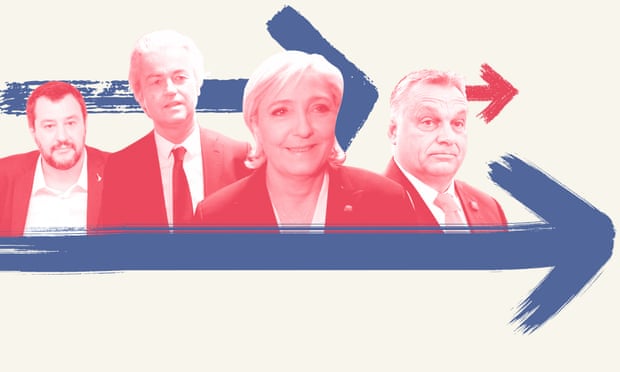- UID
- 20
- Online time
- Hours
- Posts
- Reg time
- 24-8-2017
- Last login
- 1-1-1970
|
The p-word is much misunderstood. It’s as old as democracy, and has perhaps never been as popular as it is today. So who are the key protagonists?

▼ What is populism?
That’s a vexed question. Populism is usually described as a strategic approach that frames politics as a battle between the virtuous, “ordinary” masses and a nefarious or corrupt elite.
It can be usedby politicians who are either left- or rightwing, and occasionally neither.
It is not sustained by a single consistent ideology or issue position. In the words of the leading populism scholar Cas Mudde, it is “a thin-centred ideology that considers society to be ultimately separated into two homogenous and antagonistic camps, ‘the pure people’ versus ‘the corrupt elite’”.
He also says that populists tend argue that politics should be an expression of the general will of the people, while others stress populists often have a “Manichean” world view, breaking politics into a binary view of good or evil.
For example, in the words of the archpopulist Donald Trump, from his January 2017 inauguration address: “For too long, a small group in our nation’s capital has reaped the rewards of government while the people have borne the cost.”
Who are the populists?
Populism is as old as democracy itself. The sophists of Athens’ golden age were at it hundreds of years before Julius Caesar brought his populist touch to the Roman republic.
From the 19th century, populist instincts can be detected in pro-peasantry agitation by Russian intellectuals in the 1860s and an agrarian movement in the US that grew into the People’s party 20 years later.
In the mid-20th century, academics have used the p-word to describe everything from Peronism in Argentina and McCarthyism in the US, to Nasser’s Egyptand the Poujadiste movement led by Pierre Poujadein 1950s France.
Given so many politicians – of such different stripes – can be populist, some argue the term is useless. But with so-called populists on the left and right experiencing a resurgence in the 21st century, the term is once again in the spotlight.
On the right, Trump, Viktor Orbán, Rodrigo Duterte and Matteo Salvini are often characterised as populists – and so too is the Tea partymovement that emerged out of the 2008 financial crisis.

Salvini, Geert Wilders, Marine Le Pen, Victor Orbán Composite: The Guardian Design Team
Scholars have long-described some leftist politicians, particularly in Latin America, as populists, such as Bolivia’s Evo Morales, Mexico’s Andrés Manuel López Obrador or the late Venezuela president Hugo Chavez. In Spain, the anti-austerity party Podemos is characterised as populist, and so too is the Democratic senator Bernie Sanders in the US.
Not everyone agrees about all this. The influential political scientist Jan-Werner Müller has cast doubt on whether some of these leftists are true populists.
Are all populists the same?
Absolutely not. One of the reasons the word has proven so problematic is that politicians who adopt populist styles – or their supporters – balk at the idea they should be compared to their opposites on the ideological spectrum. The fact a politicians uses a populist strategy does not need to define them. Their dominant ideology – socialist, neoliberal, authoritarian – can be much more relevant to the kind of politician they are.
Some scholars argue rightwing populists tend to be “exclusionary” (omitting, say, migrants or ethnic minorities from their conception of a virtuous people), whereas leftwing populists have a broader, inclusive concept of who counts as “the people”.
Are they popular?
Increasingly so. Populists have broken through in India, Mexico, the Philippines, Brazil and the US to win power in recent years.
In Europe, Guardian research has established that populists have tripled their vote over the past 20 years, such that more than one in four Europeans voted for populist parties on average at their last election. While 12.5 million Europeans lived in a country with at least one populist cabinet member in 1998, in 2018 that had risen more than tenfold, to 170.2 million.
In Germany, the far-right populist party Alternative fur Deutschland increased its vote more than sixfold in 2017 to become the third-largest party in parliament. In Italy, populists performed even better in 2018, with three populist parties in the top five, gaining between them more than half of the vote.
In the UK, Ukip drove its vote tally from 100,000 in 1997 to almost 4 million in 2015, though it fell back two years later once the party’s core policy – leaving the EU – had been all but delivered in the 2016 referendum.
In the past 10 years, populists have also gained power in Greece, Hungary, Poland and Czech Republic, and a have share of power inAustria and Norway.
Why have the new populists emerged now?
Globalisation. Recession. Mass migration. Soaring inequality. The perceived failure of the political establishment to deal with any of the above.A slew of factors have combined in recent years to create the impression – some would say, the reality – that the world is run by plutocrats, oligarchs and semi-detached politicians in the interests of the few not the many.
A quarter of a billion people are on the movearound the world, providing more ammunition than ever before for rightwing populists who argue that political elites have failed to get a handle on the kind of immigration that they say threatens jobs, wages and social cohesion.
Meanwhile, the number of billionaires has jumped fivefold in the last 20 years, to more than 2,200, according to Forbes, as globalisation opened up new markets for entrepreneurs to tap while at the same time making it possible to shield capital, assets and income from the taxman. The world’s eight richest peopleown as much as the poorest 3.5 billion. The amount of money offshored by the financial elite is put at as much as £10 trillion – that’s a number with 13 zeroes.
But there are also many non-economic factors that may offer partial explanations for populism’s rise: a cultural backlash against elites, a technological revolution that has rewired our politics, a convergence of now indistinguishable left and right political parties on a technocratic centre.
Exactly what mix of factors has created such a fertile backdrop for populists is a subject of much debate.But as Benjamin Moffitt puts it in his book, The Global Rise of Populism: “The time is ripe for canny political actors who can speak effectively in the name of ‘the people’ to make great political gains.”
Are they democrats?
By definition, yes. Populists operate within democratic systems, even though, once in power, some have a habit of chipping away at the tenets of liberal democracy, as Orbán has done in Hungary.
In fact, it could be argued that as populism galvanises a large, disillusioned base of overlooked voters and offers them fresh representation, it is quintessentially democratic.
So is populism good or bad?
That depends on who you ask. It is probably fair to say populism has acquired negative associations, particularly in Europe, where divisive rightwing populists are on the rise. Research by a global network of academics – Team Populism – found that by privileging majority rule populists often erode tents of liberal democracy like minority rights and the separation of powers. But they say that populists in government can also have a modest, positive effect on voter turnout and dignify forgotten sectors of the population.
Some leftwing political theorists, such as the late Argentinian academic Ernesto Laclau and his widow, Chantal Mouffe, at the University of Westminster, have long argued that populism is an effective political strategy that can – and should – be used to revitalise politics on the left.
How can you spot a populist?
Populists tend to resort to a similar kind of rhetoric to win over their audiences. Kirk Hawkins, an associate professor at Brigham Young University in Utah, says it is not as simple as a single word or a catchphrase; a broad rhetorical lexicon tends to recur in populist oratory.
“You will see a leader talk about ordinary people in a way that reifies and romanticises them,” he says. Examples might be referring to “ the will of the people” or dropping in adjectives such as “ordinary”, “hard-working” or “taxpaying” to describe the noble masses.
“The other element you will see is a reference to the evil elite,” Hawkins says. “One thing you’ll see is an emphasis on things that are clearly meant to question their fundamental dignity as political actors if not human beings.”
For example? (▪ ▪ ▪)
► Please, read the full note/article here: Source |
|